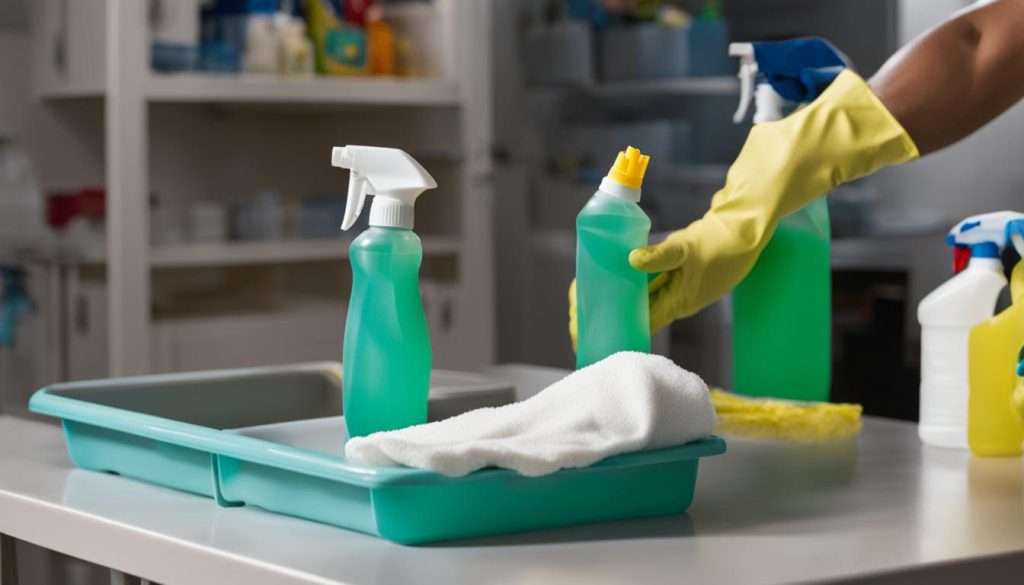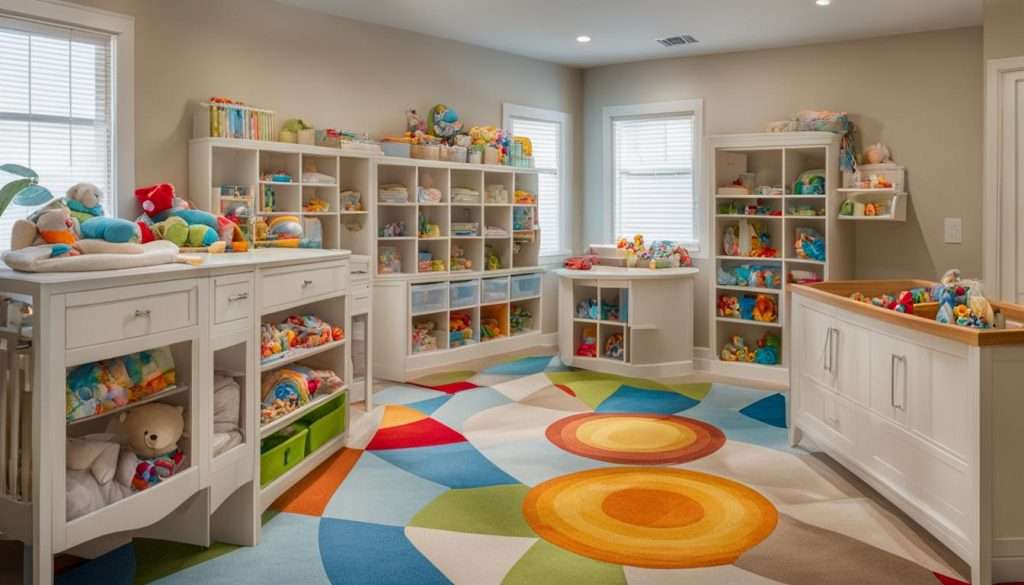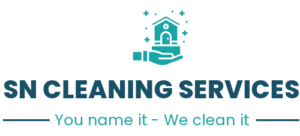Ensuring a clean and hygienic environment in nurseries is crucial for the health and safety of children in childcare settings. Regular and thorough nursery cleaning practices are essential to prevent the spread of diseases, maintain a safe environment, and create a professional image. In this article, we provide essential tips and guidelines for nursery cleaning, sourced from regulations and guidelines for early years provisions in the UK.
Key Takeaways
- Regular and thorough nursery cleaning is essential for safe childcare.
- Nursery cleaning is the responsibility of both employers and employees.
- The Statutory Framework outlines specific cleaning requirements for early years provisions.
- Maintaining cleanliness and hygiene in nurseries prevents the spread of diseases and creates a safe environment.
- Choosing between internal and external provision for nursery cleaning requires careful consideration.
Employers’ Duties for Nursery Cleaning
Under the Health and Safety at Work Act 1974, employers have a general duty to ensure the health, safety, and welfare of their employees. This duty extends to nursery settings, where employers are responsible for maintaining cleanliness and hygiene to create a safe environment for children and staff.
The Workplace (Health, Safety, and Welfare) Regulations 1992 specifically require employers to take measures to ensure cleanliness in the workplace. This includes keeping furniture and surfaces clean, clearing spillages immediately, and regularly removing waste. Employers must also prioritize the prevention of employees’ exposure to hazardous substances.
To meet these obligations, employers should provide training to staff on proper cleaning practices and the use of cleaning equipment and products. Regular inspections and audits should be conducted to assess the effectiveness of cleaning procedures and identify areas for improvement. By fulfilling their duties, employers can establish a clean and safe nursery environment that promotes the well-being of both children and employees.
Table: Key Responsibilities of Employers for Nursery Cleaning
| Responsibility | Description |
|---|---|
| Maintaining cleanliness | Regular cleaning of furniture, surfaces, and play areas to prevent the spread of germs and maintain a hygienic environment. |
| Clearing spillages | Promptly removing any spillages or hazards to prevent slips, trips, and falls. |
| Waste management | Regularly emptying bins and disposing of waste appropriately to maintain cleanliness and prevent pest infestations. |
| Hazardous substance control | Implementing measures to prevent employees’ exposure to hazardous substances, such as chemicals used for cleaning. |
| Training and awareness | Providing training to staff on cleaning procedures, equipment usage, and the importance of maintaining a clean and safe nursery environment. |
| Inspections and audits | Regularly evaluating the effectiveness of cleaning practices through inspections and audits to ensure compliance with regulations and identify areas for improvement. |
Employees’ Duties for Nursery Cleaning
Employees working in nurseries have a crucial role to play in maintaining cleanliness and ensuring a safe environment for children. As per health and safety regulations, employees have a duty to take care of their own health and safety, as well as the health and safety of others who may be affected by their work.
Employees must follow their employer’s arrangements for health and safety and carry out cleaning tasks safely and to the required standards. This includes using appropriate cleaning products and equipment, following correct procedures for different surfaces, and paying attention to high-touch points such as light switches and door handles.
Furthermore, employees working in environments with potential contamination, such as nurseries, should take necessary precautions to protect their own health and safety. This may include wearing personal protective equipment (PPE) such as gloves or masks, as well as practicing proper hand hygiene to prevent the spread of germs.

Key Responsibilities of Employees for Nursery Cleaning:
- Follow employer’s arrangements for health and safety
- Carry out cleaning tasks safely and to the required standards
- Use appropriate cleaning products and equipment
- Pay attention to high-touch points
- Take necessary precautions in environments with potential contamination
- Practice proper hand hygiene
By fulfilling their duties, employees contribute to creating a clean and safe environment for children in nurseries, promoting their health and well-being.
Cleaning Requirements for Early Years Provisions
The cleanliness and hygiene of early years provisions play a crucial role in ensuring the health and safety of children. To maintain a safe and hygienic environment, nurseries must adhere to the cleaning requirements outlined in the statutory framework. These requirements are designed to meet the health and safety standards necessary for childcare settings.
According to the Statutory Framework for the Early Years Foundation Stage in England, providers must ensure that their premises are fit for purpose and comply with health and safety regulations. This includes maintaining clean and hygienic changing facilities for children in nappies, as well as implementing effective cleaning practices throughout the nursery.
Similarly, the National Care Standards for Early Education and Childcare in Scotland emphasize the importance of maintaining a safe and hygienic environment. These standards highlight the need for regular cleaning, proper waste disposal, and the prevention of cross-contamination.
| Key Cleaning Requirements | Details |
|---|---|
| Regular Cleaning | Implement a cleaning schedule that includes daily, weekly, and occasional cleaning tasks to ensure all areas are regularly maintained. |
| Waste Disposal | Provide designated waste disposal areas and ensure proper waste segregation and disposal procedures are followed. |
| Cross-Contamination Prevention | Take measures to prevent cross-contamination by using separate cleaning equipment and products for different areas of the nursery. |
| Safe Cleaning Products | Use appropriate cleaning products that are safe for children, staff, and the environment, following manufacturer instructions. |
| High-Touch Surfaces | Pay special attention to high-touch surfaces such as doorknobs, light switches, and toys, as these can harbor germs and require frequent cleaning. |
| Training and Supervision | Ensure all cleaning staff receive appropriate training and supervision to carry out cleaning tasks effectively and safely. |
By following these cleaning requirements, early years provisions can create a clean and safe environment for children to learn and grow. It is essential for nurseries to prioritize cleanliness and hygiene in order to promote the well-being of both children and staff.
Importance of Cleaning in Nurseries
Maintaining cleanliness and hygiene in nurseries is of utmost importance to ensure the health and well-being of children. A clean and hygienic environment prevents the spread of diseases, creating a safe space for both children and staff. Additionally, it helps to establish a professional image for the nursery, instilling confidence in parents and guardians.
Proper cleaning practices also play a vital role in preventing hazards within the nursery. Regular cleaning helps to minimize risks such as slippery floors and contaminated food, safeguarding the children from potential accidents and illnesses. By adhering to cleaning protocols, nurseries can ensure compliance with regulatory standards and maintain a high level of cleanliness required for inspections.
Furthermore, effective cleaning practices contribute to the longevity of furniture and equipment in nurseries. By removing dirt, dust, and other pollutants, cleaning helps to preserve the quality and lifespan of these materials. It also helps to maintain warranties and discourage the presence of pests, creating a clean and pleasant environment for everyone.
The Role of Cleaning Services in Nursery Hygiene
While nursery staff can carry out basic cleaning tasks, hiring professional nursery cleaning services offers several advantages. Professional cleaners are trained in nursery-specific cleaning techniques and use specialized equipment and eco-friendly cleaning products. They follow industry regulations and guidelines, ensuring a safe and hygienic environment for children.
Professional cleaning services, such as Green Fox Cleaning, provide tailored cleaning solutions that meet the unique needs of each nursery. They can provide comprehensive cleaning schedules, ensuring that all areas are regularly and thoroughly cleaned. With their expertise and attention to detail, professional cleaners help nurseries maintain optimal cleanliness, hygiene, and safety standards.
| Benefits of Hiring Professional Nursery Cleaning Services |
|---|
| Expertise in nursery-specific cleaning techniques |
| Use of eco-friendly cleaning products |
| Compliance with industry regulations and guidelines |
| Customized cleaning schedules |
| Thorough and reliable cleaning services |
By prioritizing cleaning and maintaining a hygienic environment, nurseries can provide a safe and healthy space for children to learn and grow. Whether through in-house cleaning or professional services, regular cleaning practices are an essential aspect of nursery hygiene that should never be overlooked.

Internal vs. External Provision for Nursery Cleaning
When it comes to nursery cleaning, nursery managers have the option to choose between internal provision or external provision. Internal provision means directly employing cleaning staff, while external provision involves hiring a cleaning contractor.
Internal provision gives the nursery more control over the cleaning service. It allows for direct management and supervision of the cleaning staff, ensuring that cleaning tasks are carried out to the required standards. However, this option comes with administrative responsibilities and the need to dedicate resources to managing the cleaning staff.
On the other hand, external provision offers benefits such as cost savings and access to specialized cleaning services. Hiring a professional cleaning contractor can be more cost-effective than maintaining an in-house cleaning team. It also allows the nursery to benefit from the expertise and experience of the cleaning contractor, who will have knowledge of best practices and industry standards.
However, there are potential drawbacks to consider. With external provision, there is a risk of lower quality or service interruption if the cleaning contractor fails to meet expectations. It is important to thoroughly assess and select a reputable cleaning contractor to ensure that the chosen service provider can deliver the required standards of cleanliness and hygiene.
Creating a Specification of Requirement for Nursery Cleaning
In order to ensure that nursery cleaning meets the required standards and health and safety regulations, it is essential to create a comprehensive specification of requirement. This document outlines the specific cleaning tasks, quality of cleanliness, and legal standards that the nursery cleaning service must adhere to. By clearly defining the scope of work, a specification of requirement helps in maintaining a safe and hygienic environment for children.
The specification of requirement should include the following:
- The quality of cleanliness required for different areas of the premises, such as classrooms, play areas, and washrooms.
- Specific cleaning tasks that need to be carried out on a regular basis, including dusting, vacuuming, mopping, and sanitizing high-touch surfaces.
- Guidelines for the use of cleaning products, ensuring that they are safe for children and do not cause any allergic reactions.
- Instructions for waste management and disposal, in compliance with local regulations.
- Requirements for cleaning schedules, outlining the frequency of different cleaning tasks.
By having a clear specification of requirement, nursery managers can effectively communicate their expectations to cleaning staff or contractors and ensure that the cleaning service meets the necessary standards. Regular monitoring and evaluation can be carried out to ensure compliance with the specification and maintain a clean and safe environment for children.
| Cleaning Task | Frequency |
|---|---|
| Dusting and wiping surfaces | Daily |
| Vacuuming or mopping floors | Daily |
| Sanitizing high-touch surfaces (light switches, door handles, etc.) | Multiple times a day |
| Cleaning washrooms and changing facilities | Daily |
| Emptying and sanitizing bins | Daily |
| Managing waste disposal | As needed, in compliance with local regulations |
Work Schedules and Good Cleaning Practices
Developing work schedules is essential for efficient and effective nursery cleaning. By creating a well-structured plan, cleaning tasks can be carried out regularly and in accordance with specific requirements. A comprehensive work schedule ensures that all areas of the nursery are cleaned thoroughly and that no tasks are overlooked.
Good cleaning practices play a vital role in maintaining a clean and safe environment for children. It is important to use appropriate cleaning products and follow correct procedures for different surfaces. Regularly sanitizing high-touch points such as light switches and door handles helps prevent the spread of germs. By adhering to good cleaning practices, nurseries can ensure the well-being of children and staff.
To illustrate the importance of work schedules and good cleaning practices, the following table provides an example of a weekly cleaning schedule for a nursery:
| Day | Cleaning Task |
|---|---|
| Monday | Vacuuming carpets and rugs |
| Tuesday | Cleaning and disinfecting toys |
| Wednesday | Mopping floors |
| Thursday | Cleaning and sanitizing bathroom facilities |
| Friday | Dusting surfaces and wiping down furniture |
| Saturday | Deep cleaning kitchen area |
| Sunday | Rest day |
By following a structured work schedule like this, nurseries can ensure that cleaning tasks are distributed evenly throughout the week, providing a consistently clean environment for children and staff.
Importance of Hand Washing in Nursery Cleaning
Hand washing plays a crucial role in maintaining hygiene and preventing the spread of infections in nurseries. Proper hand washing should be taught to both staff and children, and it should be done frequently and correctly. By washing hands regularly, we can effectively remove germs and reduce the risk of illness.
Key times for hand washing in nurseries include after using the toilet, before and after dealing with body fluids, before preparing and eating food, and when hands appear dirty. It is important to encourage thorough hand washing, ensuring that all areas, including the palms, backs of hands, between fingers, and under fingernails, are properly cleaned.
Teaching and practicing proper hand washing techniques is not only essential for the health and well-being of children but also for the safety of the nursery staff. By incorporating hand washing into daily routines and ensuring compliance with hygiene practices, nurseries can create a clean and healthy environment for everyone involved.
Benefits of Hand Washing in Nursery Cleaning:
- Prevents the spread of infections and diseases
- Reduces absenteeism among children and staff
- Promotes good hygiene habits
- Creates a safe and healthy environment
- Instills confidence in parents and guardians
| Hand Washing Steps | Duration |
|---|---|
| Wet your hands with clean running water | At least 20 seconds |
| Apply soap and lather well | |
| Rub your hands together, ensuring all areas are covered | |
| Scrub the backs of your hands, between fingers, and under fingernails | |
| Rinse your hands thoroughly under running water | |
| Dry your hands with a clean towel or air dryer |
Food Safety in Nursery Cleaning
When it comes to nursery cleaning, ensuring food safety is of utmost importance. The nursery kitchen plays a significant role in maintaining the hygiene and well-being of children. Proper cleaning and hygiene practices must be implemented to prevent foodborne illnesses and cross-contamination.
One crucial aspect of food safety in nursery cleaning is storing food correctly. It is essential to separate raw and cooked food to prevent cross-contamination. This means storing raw meat, poultry, and seafood separately from other food items. Additionally, perishable foods should be stored in the refrigerator at appropriate temperatures to inhibit bacterial growth.
In the nursery kitchen, safe food preparation practices should be followed. This includes washing fruits and vegetables thoroughly before use, avoiding cross-contamination by using separate cutting boards for different food groups, and cooking food to the appropriate temperature to destroy harmful bacteria.
Regular sanitization of high-touch points in the kitchen is crucial for maintaining food safety. Light switches, door handles, and kitchen utensils should be cleaned and disinfected regularly to prevent the spread of germs. By implementing proper hygiene practices in the nursery kitchen, the risk of foodborne illnesses can be significantly reduced, ensuring the health and well-being of children in childcare settings.

The Importance of Hiring Professional Nursery Cleaning Services
When it comes to ensuring safe childcare, professional nursery cleaning services play a vital role. Green Fox Cleaning, a leading provider in the industry, offers comprehensive cleaning solutions tailored specifically for nurseries. Their expertise and attention to detail guarantee a safe and hygienic environment for children.
Professional nursery cleaners, like the team at Green Fox Cleaning, are trained in the latest nursery-specific cleaning techniques. They understand the unique cleaning challenges that nurseries face and have the knowledge and experience to tackle them effectively. By entrusting the cleaning responsibilities to professionals, nurseries can focus on providing quality care while maintaining a clean and safe environment.
One of the key advantages of hiring professional cleaners is their commitment to using eco-friendly cleaning products. Green Fox Cleaning, for instance, prioritizes the use of environmentally friendly cleaning solutions that are safe for children, staff, and the environment. This ensures that nurseries not only meet the highest cleaning standards but also contribute to a sustainable future.
With strict adherence to industry regulations and guidelines, professional nursery cleaning services guarantee the highest standards of hygiene. By partnering with Green Fox Cleaning, nurseries can be confident that their cleaning needs are met with the utmost professionalism and attention to detail. The result is a clean, safe, and healthy environment that promotes the well-being and development of every child.
